Can Curcumin Reduce Inflammation Linked to Depression?
Introduction
Depression isn’t just about emotions — it’s about biology, too. While it’s often described as a chemical imbalance, research now shows that inflammation plays a major role in how depression develops and persists. Chronic inflammation can affect mood-regulating neurotransmitters, hormone balance, and even brain structure.
That’s where curcumin, the golden compound from turmeric, comes in. Known for its powerful anti-inflammatory and antioxidant effects, curcumin has been studied not only for joint pain and immunity but also for its potential in supporting mental health — particularly depression.
So, can curcumin really help reduce inflammation linked to depression? Let’s explore the science, mechanisms, and practical ways to integrate it into your routine 🌼
Looking for supplements for Brain Fog? Click here.
💭 Understanding the Inflammation–Depression Connection
For years, scientists thought depression was caused mainly by low serotonin or dopamine. But newer studies suggest a more complex story — one involving the immune system and chronic low-grade inflammation.
Inflammation is the body’s natural defense mechanism. It protects us from infections, injuries, and toxins. But when inflammation becomes chronic — often due to stress, poor diet, sleep deprivation, or illness — it can harm the brain and mood-regulating systems.
🔥 How Inflammation Triggers Depression
Cytokine release: Inflammatory molecules like IL-6, TNF-alpha, and CRP increase during chronic stress or illness.
Neurotransmitter disruption: These cytokines can deplete tryptophan (the amino acid that makes serotonin), leading to lower serotonin levels.
Brain inflammation: Over time, inflammatory molecules cross the blood-brain barrier, activating microglia — the brain’s immune cells — creating a state of “neuroinflammation.”
HPA-axis dysregulation: Chronic inflammation elevates cortisol, leading to fatigue, anxiety, and emotional numbness.
🧠 In short: When your body is inflamed, your brain feels it too — and your mood reflects that imbalance.
🌼 Curcumin: Nature’s Anti-Inflammatory Powerhouse
Curcumin is the active compound in turmeric (Curcuma longa) — a golden-yellow spice widely used in Indian and Southeast Asian cuisines. It’s been prized for centuries in Ayurveda for its “cooling” and healing properties.
Modern science has confirmed that curcumin is a potent anti-inflammatory, antioxidant, and neuroprotective compound.
✨ Key Properties of Curcumin
Anti-inflammatory: Blocks pro-inflammatory enzymes like COX-2 and NF-kB.
Antioxidant: Neutralizes free radicals that damage cells.
Neurotrophic: Increases Brain-Derived Neurotrophic Factor (BDNF), which supports brain growth and resilience.
Antidepressant-like: Balances serotonin, dopamine, and noradrenaline in animal and human studies.
🌿 In essence, curcumin doesn’t just calm inflammation — it also nurtures your brain’s natural repair systems.
🔬 The Science: What Research Says About Curcumin and Depression

Over the last decade, dozens of clinical trials have explored the effects of curcumin on mood disorders — and the results are promising.
📊 Key Studies
🧩 Study #1: Curcumin vs. Antidepressants
A 2014 double-blind study compared curcumin (1,000 mg/day) to fluoxetine (Prozac) in patients with major depressive disorder (MDD). After 6 weeks, both groups improved significantly — but the combination of curcumin and fluoxetine worked better than either alone.
👉 Conclusion: Curcumin can complement traditional antidepressants and enhance their effects (Sanmukhani et al., Phytotherapy Research, 2014).
🌼 Study #2: Inflammatory Biomarkers and Mood
A 2016 meta-analysis of 10 randomized controlled trials found that curcumin supplementation significantly reduced depressive symptoms — especially in people with elevated inflammatory markers like CRP and IL-6.
👉 Conclusion: Curcumin appears particularly effective for inflammation-related depression (Ng et al., Journal of the American Medical Directors Association, 2016).
🌿 Study #3: Curcumin and BDNF
A 2018 study observed that curcumin increased BDNF levels in people with mild depression — similar to how exercise and antidepressants work.
👉 Conclusion: Curcumin supports neuroplasticity, the brain’s ability to adapt and grow (Zheng et al., Frontiers in Pharmacology, 2018).
🧠 Summary of the Evidence
| Benefit | Mechanism | Supported By |
|---|---|---|
| Reduces inflammation | Decreases cytokines (IL-6, TNF-alpha) | ✅ Multiple trials |
| Boosts neurotransmitters | Supports serotonin, dopamine balance | ✅ Animal + human studies |
| Enhances neuroplasticity | Increases BDNF | ✅ Laboratory + clinical data |
| Antioxidant protection | Reduces oxidative stress in the brain | ✅ Extensive evidence |
| Works with antidepressants | Synergistic effects with SSRIs | ✅ Human clinical trials |
🌿 How Curcumin Works in the Body
1️⃣ Blocks NF-kB Pathway
NF-kB is a protein complex that turns on inflammatory genes. Curcumin blocks NF-kB activation, helping calm the inflammatory cascade.
2️⃣ Reduces Cytokines
Curcumin lowers pro-inflammatory cytokines like IL-1β, IL-6, and TNF-α, reducing “inflammatory noise” in the brain.
3️⃣ Boosts Antioxidant Enzymes
It increases glutathione and superoxide dismutase (SOD), protecting neurons from oxidative damage.
4️⃣ Increases BDNF
Low BDNF levels are linked to depression and anxiety. Curcumin boosts BDNF, encouraging new neuron growth and improving resilience.
5️⃣ Balances Neurotransmitters
Preclinical research shows curcumin raises serotonin, dopamine, and noradrenaline — mirroring antidepressant effects, but naturally.
💛 The result: Less inflammation, better brain signaling, and improved mood regulation.
🩺 Who May Benefit the Most
Curcumin isn’t a one-size-fits-all solution — but it may be particularly helpful for people whose depression involves an inflammatory or stress-related component.
You may benefit if you:
Have chronic stress or fatigue
Experience inflammation-related conditions (arthritis, IBS, etc.)
Have high CRP or inflammatory markers
Struggle with “brain fog” or slow cognition
Notice worsened mood during illness or after poor diet
Curcumin also supports people with MS, autoimmune disorders, or gut inflammation, where depression and inflammation often coexist.
💊 How to Take Curcumin for Mood and Inflammation
Curcumin in turmeric is potent — but not easily absorbed. To get the best results, you need enhanced-absorption formulations.
🧴 Types of Curcumin Supplements
Curcumin with Piperine (Black Pepper Extract)
Piperine boosts absorption by up to 2000%.
Look for 500–1000 mg curcumin + 5–10 mg piperine.
Phytosomal Curcumin (Meriva®)
Bound to phospholipids for superior absorption.
Gentle on the stomach and long-lasting.
Nano-Curcumin or Micronized Curcumin
Uses tiny particles for enhanced bioavailability.
Turmeric Root Extract Capsules
Contains curcuminoids plus natural synergistic compounds.
🕒 Best Time to Take It
Morning: For mood and inflammation regulation throughout the day.
With Meals: Curcumin is fat-soluble — pair it with avocado, olive oil, or nuts for optimal absorption.
⚖️ Suggested Daily Dosage
| Type | Effective Dose | Notes |
|---|---|---|
| Curcumin + Piperine | 500–1000 mg 2x/day | Affordable and effective |
| Meriva® Phytosome | 250–500 mg 2x/day | Highly bioavailable |
| Turmeric extract (95% curcuminoids) | 1000–2000 mg/day | Take with fat and pepper |
⚠️ Always consult your healthcare provider before starting if you’re taking medications (especially blood thinners or antidepressants).
🌞 Combining Curcumin with Lifestyle and Other Supplements
Curcumin is most powerful when integrated into a holistic anti-inflammatory lifestyle.
🍽️ Nutrition
Eat a Mediterranean-style diet rich in:
Leafy greens 🥬
Fatty fish 🐟
Olive oil 🫒
Berries 🍓
Nuts and seeds 🌰
Avoid ultra-processed foods, refined sugar, and trans fats — all of which fuel inflammation.
Looking for supplements for Brain Fog? Click here.
💨 Breathwork
Breathing techniques calm the vagus nerve, reducing inflammation and cortisol. Try:
Box Breathing: Inhale 4s → Hold 4s → Exhale 4s → Hold 4s.
Physiological Sigh: Two short inhales, one long exhale.
💬 Pairing breathwork with curcumin helps the body “reset” from both top-down (mind) and bottom-up (body) directions.
Want to try Breathwork? Click Here.
🧘 Therapy and Mindfulness
Curcumin reduces biological inflammation; therapy helps regulate emotional inflammation — the reactive patterns that fuel distress.
CBT (Cognitive Behavioral Therapy): Builds awareness of thought-emotion cycles.
Mindfulness meditation: Reduces amygdala activity and promotes emotional stability.
Somatic therapies: Integrate body awareness to reduce nervous system hyperarousal.
Together, these support curcumin’s neuroprotective effects, leading to greater emotional resilience 🌼
Looking for online therapy ? Click Here.
🌿 Complementary Supplements
| Supplement | Synergy with Curcumin | Benefit |
|---|---|---|
| Omega-3s | Anti-inflammatory, supports neurotransmitters | Mood stability |
| Magnesium Glycinate | Calms nervous system | Reduces anxiety |
| Vitamin D3 | Regulates serotonin synthesis | Enhances mood |
| Probiotics | Supports gut-brain axis | Reduces inflammation |
| CoQ10 | Cellular energy and antioxidant | Improves motivation and clarity |
🧩 When combined, these nutrients create a biochemical foundation for mood balance.
💬 Real-Life Benefits and Stories
Many people using curcumin for inflammation notice “side benefits” like:
More mental clarity ☀️
Less joint stiffness 🦵
Better emotional balance ❤️
Improved energy and sleep
For example, participants in long-term studies reported that curcumin made their emotional lows less intense and that they felt more even-keeled — less irritable, more focused, and better able to handle stress.
These effects seem strongest in those who pair supplementation with healthy routines, not just pills.
🧘 Safety, Side Effects, and Considerations
Curcumin is considered very safe, but it can cause mild effects in some people, such as:
Nausea or upset stomach (if taken on an empty stomach)
Mild diarrhea (at high doses)
Interference with blood thinners or diabetes meds
💡 To minimize side effects:
Take curcumin with food and healthy fats.
Start low and build up gradually.
Choose standardized, high-quality extracts from trusted brands.
🌈 Curcumin as a Bridge Between Body and Mind

Depression is not just a “chemical imbalance” — it’s often a sign of the body’s internal inflammation response crying out for balance. Curcumin acts as a bridge between physical and emotional healing:
It calms inflammation that clouds mood.
It nourishes the brain with antioxidant protection.
It works synergistically with therapy, exercise, and diet.
🌿 When combined with holistic self-care — sunlight, breathwork, rest, and emotional support — curcumin becomes more than a supplement. It becomes part of a mind-body healing system that encourages stability, clarity, and calm.
💡 Sample Daily Routine for Anti-Inflammatory Mood Support
| Time | Routine | Why It Helps |
|---|---|---|
| 🌅 Morning | Take curcumin + omega-3 with breakfast | Reduces inflammation, supports energy |
| ☀️ Midday | 10-minute sunlight walk + hydration | Boosts serotonin + lowers cortisol |
| 🌿 Afternoon | L-Theanine tea or deep breathing | Supports relaxation |
| 🌙 Evening | Magnesium glycinate + mindfulness journaling | Calms the nervous system |
| 💤 Night | Restorative sleep (7–9 hours) | Essential for emotional regulation |
✨ Over time, these small actions compound into lasting mood balance.
🌻 The Future of Curcumin and Mental Health
Scientists are now exploring curcumin’s potential as part of a multi-target approach to depression treatment. Emerging research includes:
Curcumin nanoparticles for higher absorption
Curcumin + probiotics (synbiotics) to target the gut-brain axis
Curcumin + conventional therapy combinations showing enhanced outcomes
The beauty of curcumin lies in its versatility — it supports both the body’s chemistry and the mind’s healing process.
🧩 Key Takeaways
✅ Inflammation contributes to depression. Chronic inflammation disrupts serotonin, dopamine, and cortisol balance.
✅ Curcumin fights inflammation and oxidative stress. It’s scientifically proven to reduce cytokines and neuroinflammation.
✅ It supports brain health. Curcumin boosts BDNF and protects neurons.
✅ It complements therapy and antidepressants. Research shows additive benefits.
✅ Consistency matters. The benefits build gradually over 4–8 weeks of regular use.
💛 In other words, curcumin may not be a “cure,” but it’s a powerful ally in restoring mood balance and reducing inflammation-driven emotional suffering.
📚 References
Sanmukhani, J., et al. (2014). “Efficacy and safety of curcumin in major depressive disorder: A randomized controlled trial.” Phytotherapy Research, 28(4), 579–585.
Ng, Q. X., et al. (2016). “A meta-analysis of the clinical use of curcumin for the treatment of major depressive disorder.” J Am Med Dir Assoc, 17(9), 852–858.
Lopresti, A. L., & Drummond, P. D. (2017). “Efficacy of curcumin, the major component of turmeric, in the treatment of mood disorders.” Phytotherapy Research, 31(12), 1758–1770.
Zheng, X., et al. (2018). “Curcumin elevates BDNF and improves depression-like behavior.” Frontiers in Pharmacology, 9(122).
Miller, A. H., & Raison, C. L. (2016). “The role of inflammation in depression.” Nat Rev Immunol, 16(1), 22–34.
Cusinato, J. et al. (2021). “Curcumin’s effects on inflammation and depressive symptoms: A review.” Nutrients, 13(10), 3470.
Porges, S. W. (2011). The Polyvagal Theory: Neurophysiological Foundations of Emotion, Attachment, Communication, and Self-Regulation. W. W. Norton & Co.
Related Posts
-

Nootropics That Promote Calm and Rest
Explore the world of calming nootropics — natural brain enhancers that promote relaxation, better focus, and deeper rest. Learn how L-Theanine, magnesium, ashwagandha, and other adaptogens help balance your nervous system, reduce stress, and support restorative sleep.
-

Best Natural Supplement Stack for Sleep
Discover the best natural supplement stack for deep, restorative sleep. Learn how nutrients like magnesium, L-theanine, glycine, and calming herbs such as chamomile and ashwagandha work together to relax your body, calm your mind, and improve sleep quality—naturally and safely.
-

Combining L-Theanine and Magnesium for Sleep: A Calm Night, Naturally
Discover how combining L-Theanine and Magnesium can help you drift into deep, restorative sleep. Learn how this natural duo calms the mind, relaxes the body, and supports your nervous system—without grogginess the next morning.
-

How to Sleep Better After Intense Workouts
Struggling to fall asleep after a tough workout? Learn how to optimize your post-training recovery with nutrition, hydration, and science-backed sleep strategies. Discover how to calm your nervous system, balance hormones, and wake up fully recharged for your next session.
-

Ashwagandha and Valerian: A Bedtime Combo for Deep Rest and Emotional Reset
Discover the calming synergy of Ashwagandha and Valerian root, two natural sleep aids that help quiet the mind, ease anxiety, and promote deeper rest. Learn how this herbal duo supports the nervous system, balances stress hormones, and restores emotional peace — without next-day grogginess.
-

How to Create a Resilience-Boosting Diet
Discover how to build emotional and physical strength from the inside out with a resilience-boosting diet 🍎. Learn which foods stabilize your mood, how supplements like magnesium and omega-3s strengthen your stress response, and why pairing nutrition with breathwork and therapy creates lasting calm, focus, and vitality 🌿💪.
-

Best Teas and Herbal Blends for Calmness: Nature’s Way to Restore Inner Peace
Ashwagandha, the ancient adaptogenic herb, helps your body find balance during stress. Known as “Indian ginseng,” it supports cortisol regulation, boosts energy, and restores calm clarity. Discover how this powerful root promotes resilience, emotional balance, and steady vitality — one cup at a time. 🌸
-

Parenting and Emotional Strength: How to Raise Children Without Losing Yourself
Empathy is the bridge that connects hearts — the quiet power to understand, feel, and support another’s emotions without judgment. Learn how empathy strengthens relationships, enhances communication, and cultivates deeper compassion in everyday life. 🌿
-

How to Bounce Back from Public Failure: Reclaiming Confidence, Purpose, and Power
Visualization is more than imagination — it’s brain training for resilience. By picturing calm, success, or healing, you activate the same neural pathways as real experience. Learn how daily visualization rewires your brain for confidence, emotional balance, and recovery from stress. ✨
-

Coping with Financial Stress Through Resilience: How to Stay Grounded When Money Feels Tight
Body awareness is the foundation of emotional resilience. By tuning into your body’s signals — tension, fatigue, or calm — you learn to recognize stress before it overwhelms you. Discover how mindfulness, gentle movement, and breathwork can deepen your connection with your body and restore balance from the inside out. 🧘
-

How to Stay Positive During Chronic Illness: A Guide to Emotional Strength and Hope
Creativity is more than art — it’s a form of healing. Whether through painting, writing, music, or small acts of expression, creativity helps release emotion, calm the nervous system, and reconnect you to joy. Discover how to use creativity as a tool for emotional balance, resilience, and self-discovery. 🌿
-

Resilience Tips for Caregivers: How to Stay Strong While Caring for Others
Joy isn’t the absence of pain — it’s the quiet strength to find light even in challenging times. Cultivating joy through small daily moments restores balance, releases stress, and reminds you of life’s beauty. Learn how to reconnect with authentic happiness, rebuild emotional energy, and nurture your nervous system through gratitude, presence, and play. 🌿
-

Building Resilience After a Breakup: How to Heal, Rebuild, and Rise Stronger
Social connection is one of the strongest predictors of emotional resilience. During difficult times, genuine relationships act as anchors — calming the nervous system, reducing stress hormones, and helping you regain perspective. Learn how cultivating real human connection can strengthen your mind, heart, and overall well-being. 🌿
-

How to Stay Emotionally Strong During Job Loss
Your emotions are powered by brain chemistry — a delicate balance of neurotransmitters like serotonin, dopamine, and cortisol. When these chemicals work in harmony, you feel calm, focused, and resilient. Learn how daily habits, nutrition, and mindfulness can support your brain chemistry and boost emotional well-being naturally. 🌿
-

The Role of Hormones in Emotional Stability: How Your Chemistry Shapes Your Calm
Hormones shape more than your body — they shape your emotions, resilience, and sense of calm. From cortisol to serotonin, these chemical messengers influence how you react to stress, connect with others, and recover from challenges. Learn how to balance your hormones naturally to build lasting emotional stability and harmony within. 💫
-

Mitochondria and Emotional Energy: The Cellular Power Behind Your Mood
Breathwork is one of the most powerful tools for emotional regulation and cellular balance. Through intentional breathing, you can calm your nervous system, increase oxygen flow to the brain, and even support mitochondrial energy. Learn how conscious breathing connects body and mind — transforming stress into presence and emotional strength. 🌿
-

Inflammation and Its Impact on Mood Resilience: The Silent Link Between Body and Mind
Inflammation doesn’t just affect the body — it impacts the mind. Chronic inflammation alters brain chemistry, depletes serotonin, and makes emotional recovery harder. Learn how calming inflammation through nutrition, mindfulness, and sleep can restore balance, resilience, and a renewed sense of emotional strength. 💫
-

How Antioxidants Protect Emotional Well-being: The Hidden Link Between Oxidative Stress and Mental Health
Antioxidants do more than protect your body — they defend your mind. By neutralizing oxidative stress, antioxidants support serotonin, dopamine, and brain energy pathways that keep you calm, focused, and emotionally balanced. Discover how foods like berries, green tea, and dark chocolate nourish your brain, boost mood, and strengthen resilience from the inside out. 🌿✨
-

The HPA Axis and Emotional Health: The Hidden Bridge Between Stress and Mind
Neuroplasticity — the brain’s ability to rewire and adapt — is the foundation of emotional healing and resilience. When you face stress, trauma, or change, your neural pathways can reshape themselves to support new patterns of calm, focus, and self-awareness. Learn how daily practices like mindfulness, therapy, and breathwork strengthen neuroplasticity to transform emotional pain into personal growth. 🌸
-

Why Cortisol Control Is Key to Resilience: Mastering Stress to Build Emotional Strength
Controlling cortisol — the body’s main stress hormone — is the secret to lasting resilience. When cortisol levels stay balanced, your mind becomes clearer, emotions steadier, and energy more sustainable. Learn how breathwork, mindset shifts, adaptogens, and daily rhythms can help you calm your stress response and build true inner strength. 🌞💪
-

Dopamine’s Influence on Motivation and Recovery: Reigniting Drive and Balance
Healthy relationships are the foundation of emotional balance and resilience. Whether romantic, familial, or platonic, genuine connection releases dopamine, serotonin, and oxytocin — the brain’s “bonding trio” — helping us feel secure, motivated, and seen. Learn how trust, empathy, and communication not only strengthen your connections but also reshape your nervous system for deeper emotional well-being. 🌿🤝
-

The Role of Serotonin in Resilience: How This “Mood Molecule” Shapes Emotional Strength
Serotonin — often called the “resilience molecule” — plays a vital role in how we handle stress, regulate mood, and recover from emotional challenges. Beyond happiness, this powerful neurotransmitter helps balance the gut-brain axis, stabilize the nervous system, and support emotional flexibility. Learn how nutrition, sunlight, mindfulness, and adaptogens can naturally boost serotonin and strengthen your emotional resilience. 🌞🧠
-

How Neuroplasticity Supports Emotional Growth: Rewiring the Brain for Resilience
Neuroplasticity is the brain’s built-in power to grow, adapt, and heal — and it’s the foundation of emotional transformation. Every mindful breath, compassionate act, or reframed thought strengthens new neural pathways that support resilience and self-awareness. Learn how your brain rewires through daily habits, helping you turn emotional challenges into opportunities for growth and calm. 🌿
-

Tai Chi and Adaptogens for Mind-Body Balance: The Art of Harmonizing Energy and Resilience
Alchemy isn’t just an ancient science — it’s a timeless symbol of transformation and inner balance. By blending the physical and spiritual, alchemy teaches us that change begins from within. Just as metals are refined into gold, we too can transmute emotional pain, stress, and chaos into clarity and strength through mindful practice and self-awareness. 🌙✨
-

Cold Therapy and Emotional Control: Training the Mind Through the Body
Cold therapy isn’t just for athletes — it’s a tool for emotional mastery. By exposing your body to controlled cold, you train your nervous system to stay calm under stress, improving focus, mood, and resilience. This article explores the science of cold exposure, its impact on hormones and the vagus nerve, and how ice baths and cold showers can help you build emotional control, one breath at a time. 🧊🧘♂️
-

How Music Influences Emotional Recovery: The Healing Soundtrack of the Mind
Neuroplasticity — the brain’s ability to rewire and heal itself — is at the heart of emotional recovery. Through mindful habits, music, therapy, and consistent mental stimulation, your brain can form new connections that support resilience and well-being. Discover how neuroplasticity turns pain into growth, helping you rebuild balance, focus, and emotional strength. 🌿
-

Nature Therapy for Building Resilience: Reconnecting With the Healing Power of the Earth
Nature therapy helps rebuild emotional resilience by reconnecting you with the healing rhythms of the Earth. From forest walks to sunlight exposure, nature restores balance to your nervous system, lowers stress hormones, and teaches emotional adaptability. Learn how spending time outdoors can enhance mental clarity, calm anxiety, and awaken your natural capacity to heal. 🌞
-

Breathwork Techniques That Pair with Supplements: The Ultimate Synergy for Stress Relief and Mental Clarity
Breathwork and supplements create a powerful mind-body synergy for stress relief, focus, and energy. By combining intentional breathing with adaptogens, nootropics, and calming nutrients, you can naturally regulate cortisol, sharpen mental clarity, and boost emotional balance. This guide explores the best breathwork techniques and supplement pairings to help you feel centered, calm, and energized from the inside out. 🌿
-

Why Cortisol Balance Matters for Emotional Strength
Balancing cortisol — your body’s main stress hormone — is essential for emotional resilience. When cortisol is chronically high, your mind stays stuck in survival mode, leading to fatigue, anxiety, and emotional instability. This article explores how nutrition, supplements, breathwork, and therapy can help restore healthy cortisol rhythms, regulate the nervous system, and strengthen your ability to handle life’s challenges with calm focus and emotional strength. 🌿
-

Best Supplements for Students During Exam Season: Focus, Energy, and Memory Support
Studying late into the night? Learn which natural supplements can boost focus, memory, and mental stamina during exam season — without the crash. From omega-3s to Bacopa and Rhodiola, discover your brain’s ultimate exam support stack. 🎓🧠
-

Natural Memory Boosters for Seniors: How to Keep Your Mind Sharp and Focused
Stay mentally sharp and confident as you age. Discover science-backed natural supplements and lifestyle habits that boost memory, focus, and brain longevity for seniors. 🌿🧠
-

The Link Between Stress, Cortisol, and Memory Loss
Chronic stress can quietly erode your memory — and cortisol is the key culprit. Learn how stress hormones affect the brain, why the hippocampus shrinks under pressure, and how natural strategies can help you restore memory and mental clarity. 🧠✨
-

How to Build a Daily Supplement Routine for Memory Health
Want to sharpen your memory and stay mentally clear? Learn how to build a daily supplement routine for memory health — from morning focus to nighttime brain repair. Discover science-backed nutrients that boost recall, focus, and long-term cognitive resilience. 🧠🌿
-

Top 5 Natural Supplements for Memory Recall and Focus
Looking to boost memory and concentration naturally? Discover the top 5 supplements — Bacopa, Ginkgo Biloba, Lion’s Mane, Rhodiola, and Phosphatidylserine — that enhance focus, recall, and long-term brain health. 🧠✨
-

Top Supplements to Balance Mood Naturally
From omega-3s to adaptogens, discover the top natural supplements proven to support emotional balance, reduce stress, and promote inner calm — safely and effectively. 🌿✨
-
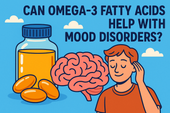
Can Omega-3 Fatty Acids Help with Mood Disorders?
Omega-3 fatty acids do more than support heart health — they can help balance mood, reduce depression, and calm anxiety. Discover how EPA and DHA nourish your brain, fight inflammation, and support emotional well-being from within. 🌊🧠
-

Vitamin D and Mood: The Sunshine Vitamin for Emotional Balance
Could the key to emotional balance be as simple as a little sunlight? Discover how vitamin D — the sunshine vitamin — influences serotonin, reduces inflammation, and helps you feel more positive and resilient year-round. ☀️💛
-

The Role of Magnesium in Reducing Irritability and Low Mood
Feeling on edge or emotionally drained? Magnesium could be the missing link between your body and your mood. Discover how this essential mineral reduces irritability, balances neurotransmitters, and helps your nervous system find calm again. 🌿✨
-
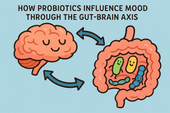
How Probiotics Influence Mood Through the Gut-Brain Axis
Discover how probiotics can do more than support your digestion—they can actually uplift your mood. This article explores the fascinating gut-brain axis and how balancing your gut bacteria through probiotics may help reduce anxiety, improve emotional stability, and support long-term mental well-being. 🌿🧠
-
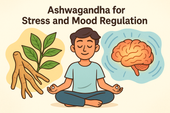
Ashwagandha for Stress and Mood Regulation
Discover how Ashwagandha, the powerful adaptogenic herb 🌿, helps your body manage stress and regulate mood. Learn how it balances cortisol, boosts GABA and serotonin, and supports emotional stability — helping you feel calm, focused, and resilient every day.
-
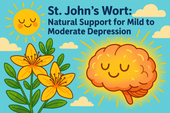
St. John’s Wort: Natural Support for Mild to Moderate Depression
Discover how St. John’s Wort, the “sunshine herb” 🌼, naturally supports mild to moderate depression. Learn how it boosts serotonin, balances mood, and promotes emotional resilience — with research showing its effectiveness compares to antidepressants, but with fewer side effects.
-
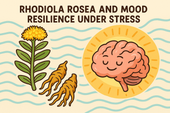
Rhodiola Rosea and Mood Resilience Under Stress
Discover how Rhodiola rosea helps your body adapt to stress 🌿. Learn how this powerful adaptogen balances cortisol, supports serotonin and dopamine, and strengthens emotional resilience — helping you stay calm, focused, and energized under pressure.
-
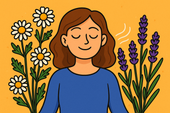
Chamomile and Lavender: Herbal Calm for Emotional Fluctuations
Discover how chamomile and lavender bring calm to emotional ups and downs 🌿. Learn how these two soothing herbs balance your nervous system, ease anxiety, and support restful sleep — naturally helping you find peace and emotional stability.
-
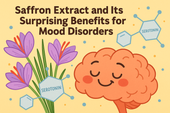
Saffron Extract and Its Surprising Benefits for Mood Disorders
Discover how saffron extract — the golden spice of joy 🌸 — can naturally support mood balance, ease anxiety, and lift mild depression. Learn what science says about its serotonin-boosting power, the ideal dosage, and how this ancient remedy compares to modern antidepressants.
-
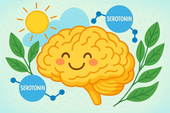
5-HTP and Serotonin: A Natural Path to Lifting Mood
Discover how 5-HTP naturally boosts serotonin 🌞 — the neurotransmitter behind mood, sleep, and emotional balance. Learn how this plant-derived compound supports happiness, reduces anxiety, and improves rest by helping your brain create more serotonin the gentle, natural way.
-
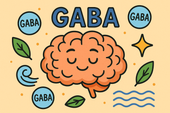
GABA Supplements for Reducing Anxiety and Mood Swings
Discover how GABA supplements can help reduce anxiety and balance mood naturally 🌿. Learn how this calming neurotransmitter works to quiet the mind, ease stress, and improve sleep — plus which nutrients and habits can boost your body’s own GABA production for long-term emotional stability.
-
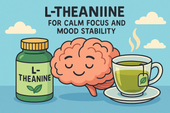
L-Theanine for Calm Focus and Mood Stability
Discover how L-theanine, the calming compound found in green tea 🍵, promotes focus, relaxation, and mood stability. Learn the science behind how it balances neurotransmitters, reduces stress hormones, and enhances clarity — helping you stay centered, calm, and productive without sedation.
-
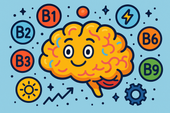
B Vitamins and Brain Chemistry: Supporting Energy and Emotional Balance
Discover how B vitamins power your brain chemistry ⚡. Learn how B6, B9, and B12 support serotonin, dopamine, and energy production — helping boost focus, mood, and emotional balance. From diet to supplements, explore how this vital nutrient group keeps your mind resilient and your energy steady.
-

N-Acetyl Cysteine (NAC) and Mood Disorders: What the Research Says
Learn how N-Acetyl Cysteine (NAC) supports brain health and mood balance 🧠. Discover how this antioxidant helps reduce oxidative stress, regulate glutamate, and improve emotional stability in depression, bipolar disorder, and anxiety — backed by cutting-edge psychiatric research.
-

Supplements for Bipolar Disorder: What May Support Stability
Discover the best supplements for bipolar disorder 🌿 that may support emotional stability and brain health. Learn how nutrients like omega-3s, magnesium, vitamin D, and NAC can help reduce inflammation, balance neurotransmitters, and complement traditional treatment safely.


















































